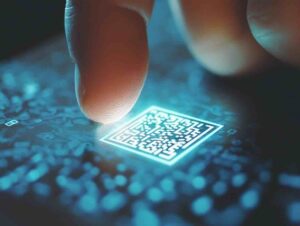Welcome to FindBiometrics’ digest of identity industry news. Here’s what you need to know about the world of digital identity and biometrics today:

FaceTec’s ‘UR Codes’ Offer Transformative Potential—for Free
FaceTec has introduced a new identity verification solution called UR Codes, combining biometric data with QR codes to offer secure, real-time identity verification. UR Codes encode biometric and biographic data, which can be verified with a live facial scan using FaceTec’s software. This system is designed for use across various sectors, including mobile driver’s licenses, credit cards, and even voter ballots. UR Codes can be printed on physical items like paper or cards, making them versatile for both digital and physical applications. To promote adoption, FaceTec is offering its UR Code technology for free to government issuers, schools, and NGOs. The system involves “biometric binding,” linking biometric data directly to verified biographic data, ensuring that the credential holder’s identity is securely verified. FaceTec’s UR Codes employ security measures, including tamper-proof encryption, and boast a low False Acceptance Rate.
IDEX Tech Enables Biometric School ID in Kenya
Vasmobile Fintelco, in collaboration with IDEX Biometrics, is launching SkoolID, a biometric smart card designed for school students in Kenya. The SkoolID, incorporating IDEX’s biometric technology and Vasmobile’s custom applets, aims to enhance security and promote digital payment solutions, moving away from cash transactions. It will serve multiple purposes, including access control, campus payments, attendance tracking, and health insurance. Supported by M-Pesa, this initiative promotes digital and financial inclusion, particularly for Africa’s young population. The multi-year agreement, valued at $1.4 million, begins in late 2024, with plans for wider deployment across Kenya and other African regions by 2026.
NEC Launches High-throughput Biometric Screening System
NEC Corporation has introduced a new biometric authentication system capable of simultaneously authenticating large numbers of people, even while they are in motion. The system, using NEC’s facial recognition technology, can process up to 100 individuals per minute in real-time, making it ideal for high-traffic areas such as airports, train stations, and tourist attractions. Initially deployed at NEC’s Tokyo headquarters, the system aims to reduce congestion and streamline movement without the need for traditional gates. With easy installation and flexible integration, NEC plans to roll out the system globally, starting in Japan, the United States, and Singapore. This development is part of NEC’s broader digital transformation initiative, “NEC BluStellar.”
Singapore’s ‘Home Team’ Wins Innovation Award for Biometric Tech
Two projects by the Biometrics & Profiling Centre of Expertise (B&P CoE) at HTX were awarded the Merit Award at the Science, Technology, and Engineering Innovation Challenge (STE IC) on August 28, 2024. HTX, Singapore’s Home Team Science and Technology Agency, developed these biometric technologies to enhance immigration procedures. Project eXtramural introduced a self-enrollment kiosk for capturing biometric data, reducing operator intervention and enrollment times. Project eXorbital launched a “Walk-Look-Clear” identification system, allowing biometric data capture while individuals are in motion.
Tobu Railway to Extend Use of Hitachi’s Biometric Tech
Tobu Railway, in partnership with Hitachi, is expanding its biometric identification service, which uses finger vein recognition technology, by the end of fiscal 2026. Initially launched in April at Tobu Store’s self-checkout machines, the system enables faster transactions, reducing payment times to 25 seconds. Tobu Railway plans to extend this service to over 100 outlets, including supermarkets, electronics stores, hotels, and convenience stores. Additionally, the company aims to implement facial recognition for train ticket verification by fiscal 2025, enhancing customer convenience across its extensive rail network and associated businesses in Japan’s Kanto region.
YubiKeys Can Be Hacked, But It Costs About $11K
A newly discovered side-channel vulnerability has exposed YubiKeys, popular hardware authentication tokens, to potential cloning attacks. The flaw, found in Infineon’s microcontroller used in YubiKey 5 series models, involves measuring electromagnetic radiation during cryptographic calculations to extract sensitive data like private keys. While Yubico has acknowledged the issue, patching affected YubiKeys running firmware prior to version 5.7 is not possible. The attack is complex and costly, requiring about $11,000 in specialized equipment and physical access to the device, making it unlikely for everyday attackers but a concern for high-level adversaries such as nation-state actors.
Congo Cancels $1.2B Biometric ID Contract
The Democratic Republic of Congo (DRC) has canceled a $1.2 billion contract with IDEMIA and Afritech for a national biometric ID system. Initially estimated to cost $360 million, the project’s budget escalated significantly, raising concerns of overpricing and corruption. The termination, announced on August 12, 2024, follows an investigative report highlighting financial mismanagement and irregularities, as well as the refusal of the World Bank to fund the project due to a lack of competitive bidding. IDEMIA confirmed the cancellation but clarified that its contract was with Afritech, not the DRC government. Despite the setback, the DRC’s National Office for Population Identification (ONIP) plans to relaunch ID issuance efforts.
Fime Looks to Future of Digital Identity, Payments with Consult Hyperion Acquisition
Fime has acquired UK-based consultancy Consult Hyperion, aiming to strengthen its position in the payments, smart mobility, and digital identity sectors. Fime, a French security consulting and testing agency, is known for its expertise in identity technology and was the first European lab accredited by NIST’s National Voluntary Laboratory Accreditation Program (NVLAP) for biometric testing. Consult Hyperion specializes in secure electronic transactions and has a reputation for helping organizations implement secure payment and identity systems. The acquisition is expected to enhance Fime’s ability to innovate in digital identity and payments, with both companies sharing a commitment to creativity and collaboration.
South Africa’s Department of Transport Picks IDEMIA for New Driver’s License Production
The Department of Transport (DOT) in South Africa has selected IDEMIA Identity and Security South Africa as the preferred bidder to produce the country’s new smart driver’s license cards. These cards will feature enhanced security measures, including biometric data, holograms, and watermarks, aimed at reducing fraud and counterfeiting. The new license will have an extended validity of eight years and is expected to be produced within five working days. IDEMIA was chosen from five bidders, continuing its work with South African government entities, despite recent controversies over a terminated contract with Airports Company South Africa (ACSA).
Mauritius Launches Digital ID as Part of Digital Transformation Strategy
Mauritius has officially launched its Mobil ID digital identity card as part of the nation’s broader “Digital Mauritius 2030” strategy. Developed in collaboration with Thales and Harel Mallac Technologies, the Mobil ID positions Mauritius as the first African country to implement a digital ID that meets international ISO standards. The new card enables citizens to manage personal data, perform electronic document signing, and offers dual authentication for identity theft protection. The initiative aims to modernize digital infrastructure and enhance public services, aligning with the country’s goal of becoming a digitally-driven economy by 2030.
—
September 6, 2024 — by Tony Bitzionis and Alex Perala








Follow Us